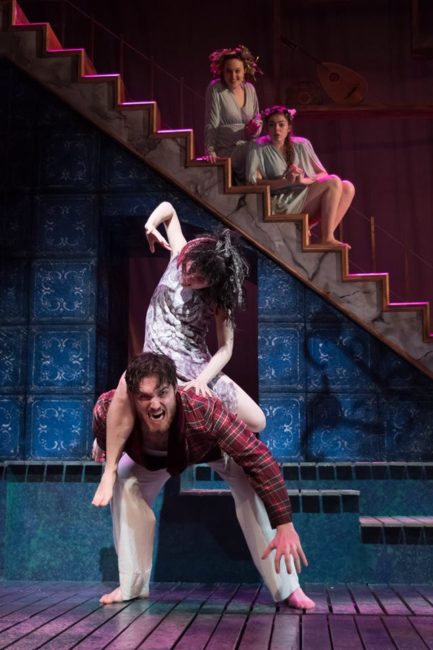“Metamorphoses,” the play put on by the College of William and Mary’s Department of Theatre, Speech and Dance from Feb. 22 – 25, was written and originally directed by Mary Zimmerman. The play is an adaptation based on the myths of Ovid. The play first premiered in 1996 at Northwestern University under the title “Six Myths.” It eventually transferred to Broadway in 2002, winning several Tony Awards, including the award for best direction of a play for Zimmerman.
The 10 myths and stories portrayed are “Cosmogony,” “Midas,” “Alcyone and Ceyx,” “Erysichthon,” “Orpheus and Eurydice,” “Vertumnus and Pomona,” “Myrrha and Cinyras,” “Phaeton,” “Eros and Psyche” and “Baucis and Philemon.” The performance takes place around a large pool of water onstage, a vital element to many of the myths depicted.
Beginning with “Cosmogony,” which explains the creation of the world, “Metamorphoses” takes its audience on an ancient trip. It brings to life the myths that society still tells and values today, stories that highlight the unified sorrows and joys of humankind, the trials and rewards of the past that translate into the present.
The stories range from that of the rich King Midas, played by Ian Carr ’21, who accidentally turns his precious daughter into gold and must travel across the earth to find a mystic pool to revive her, to Zeus and Hermes, coming down to earth disguised as beggars, only finding kindness in the poor Baucis and Philemon. The knowing audience watches as Alcyone, played by Hannah Brown ’20, stands on the shore willing King Ceyx home from his fatal voyage at sea, and as Orpheus, played by Anthony Madalone ’21, inevitably turns around, surrendering Eurydice, played by Sarah Marksteiner ’19, back to the underworld.
On a lighter note, the shy Vertumnus, played by Breese Sherman ’20, is portrayed pining after the wood nymph Pomona, played by Becca Symmes ’19. Of course, the two only get their happy ending after the tragic tale of Myrrha, played by Gabrielle Canning ’18, being cursed by Aphrodite, played by Alexandra Poirier ’19, with a relentless lust for her father, Cinyras.
And what would the play have been without the humorous tale of Phaeton, played by Cosmo Cothran-Bray ’20, complaining to a therapist, played by Riley Cruickshank ’18, about his father, the God Apollo, played by James Lynch ’20, and admitting to “driving” the sun too close to the earth and burning it. After the constant whining of Phaeton in the previous scene, the silent love story of “Eros and Psyche” that follows is welcomed.
The actors did a phenomenal job of becoming the characters they performed. From the human embodiment of the hunger that plagued Erysichthon, played by Michael Williamson ’20, to the pain on each actor’s face as his or her loved one was snatched away, the members of the ensemble really sold their identities. Not only did they create a thoroughly enjoyable and engaging experience for the audience, but they also expressed the morals and lessons hidden in each myth.
As far as plays go, the theatre department’ss rendition of “Metamorphoses” leaves the audience in awe of the performers, enlightened by the myths and with an appreciation for the complexities of the lighting, stage design and costumes.

